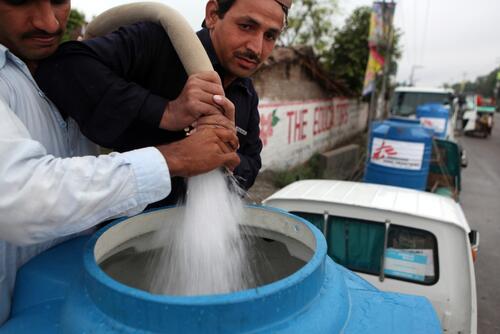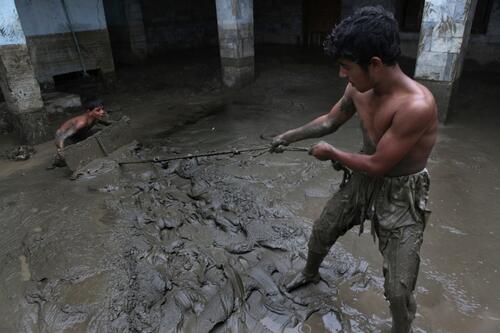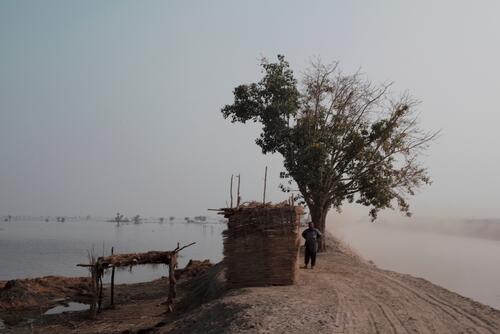From the outset of the current crisis, MSF provided health care in existing programmes in Khyber Pakhtunkhwa and Baluchistan, in addition to expanding its scope of activities to new health structures and setting up mobile clinics in other affected provinces of Pakistan like Sindh and Punjab.
Currently, the most common diseases seen in our clinics are linked to the difficult living conditions and lack of access to water.
“Out of more than 10,000 consultations in the last two weeks, the most common diseases we are treating are skin infections, respiratory diseases and acute diarrhoea” said Dr. Ahmad Mukhtar, medical coordinator for MSF in Pakistan. “Among those patients, there are some suspected cholera cases, and while we wait for official confirmation, we continue to provide them with the necessary treatment”.
In the eight mobile clinics that MSF is running in different areas of Pakistan, approximately 10 percent of the 10,000 patients seen so far have been treated for acute watery diarrhea. In Swat alone, the medical teams have carried out a total of 321 consultations out of which, 24 people were admitted to the MSF Diarrhea Treatment Centre in Mingora hospital.
Cholera is endemic in some parts of Pakistan, including the flood affected areas of Khyber Pakhtunkhwa, so the few possible cases would not be very surprising. In Lower Dir district of this very same province, MSF treated 2,500 patients when cholera broke out in August 2009.
Cholera is a disease that you can contract by ingesting infected water or food, and it can spread very easily in unhygienic conditions. Once contracted, cholera prevents the body from retaining water, and this leads to rapid dehydration. By providing oral rehydration salts, or through intravenous drips for more severe cases, the disease can be overcome fairly easily.
“Cholera is one of the severe forms of acute diarrhea. However, a few suspected cases do not mean that we’re on the verge of an outbreak” added Dr. Mukhtar. “We need to remain very vigilant and make sure that we keep identifying and treating people with acute diarrhoea as soon as possible. We treat people with acute diarrhoea exactly as if they had cholera. Our staff in mobile clinics and in hospitals play a vital role in identifying and following up possible cases in the community”.
The floods and ongoing rain obviously make the situation more challenging as people have limited access to clean water and hygienic living conditions continue to worsen. For this reason, MSF teams are also working hard to improve living conditions and access to water.

Every day, MSF provides more than 300,000 litres of clean water per day to affected communities in different parts of the country. In places like Nowshera or Charsadda, water tanks are placed in different neighbourhoods and refilled regularly. In other places like Swat MSF works with the community to make sure water is provided and shared at different places where people gather like mosques and schools.
Throughout Pakistan, MSF has distributed different kits to more than 50,239 people so far. In Fadfedar canal in the province of Baluchistan, distributions of hygiene kits and cooking sets have also included chlorine tablets to clean water and mosquito nets to prevent malaria infection. Health promotion activities are carried out in conjunction with these distributions in order to guide people on how to best purify water with the available resources.
If an outbreak – a steep increase in the number of cases – were to occur, MSF is ready to respond by expanding its intervention in terms of treatment of acute diarrhea. Emergency kits are already prepositioned in the majority of health facilities where MSF is working. However, the teams are hopeful that the delivery of water and large-scale distributions of hygiene kits and cooking sets - covering more than 7,000 families to date for MSF alone - will provide the necessary conditions to avoid the spread of any disease like cholera, but also scabies, dysentery, typhoid and malaria.
Without a doubt, much more still needs to be done to provide even basic relief to people in the flood affected areas of Pakistan; more than two weeks after the onset of the floods, too many people have still received too little.





